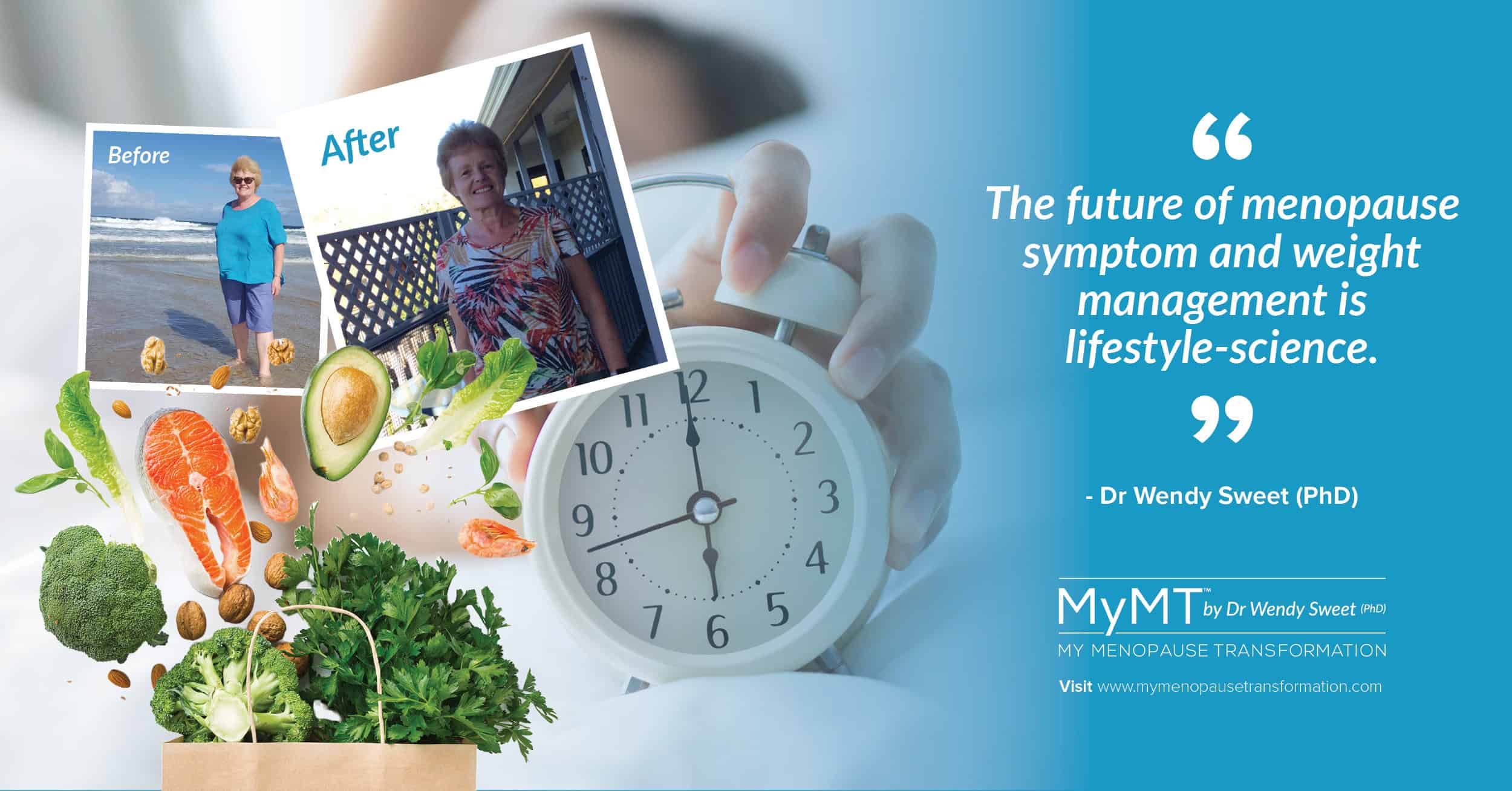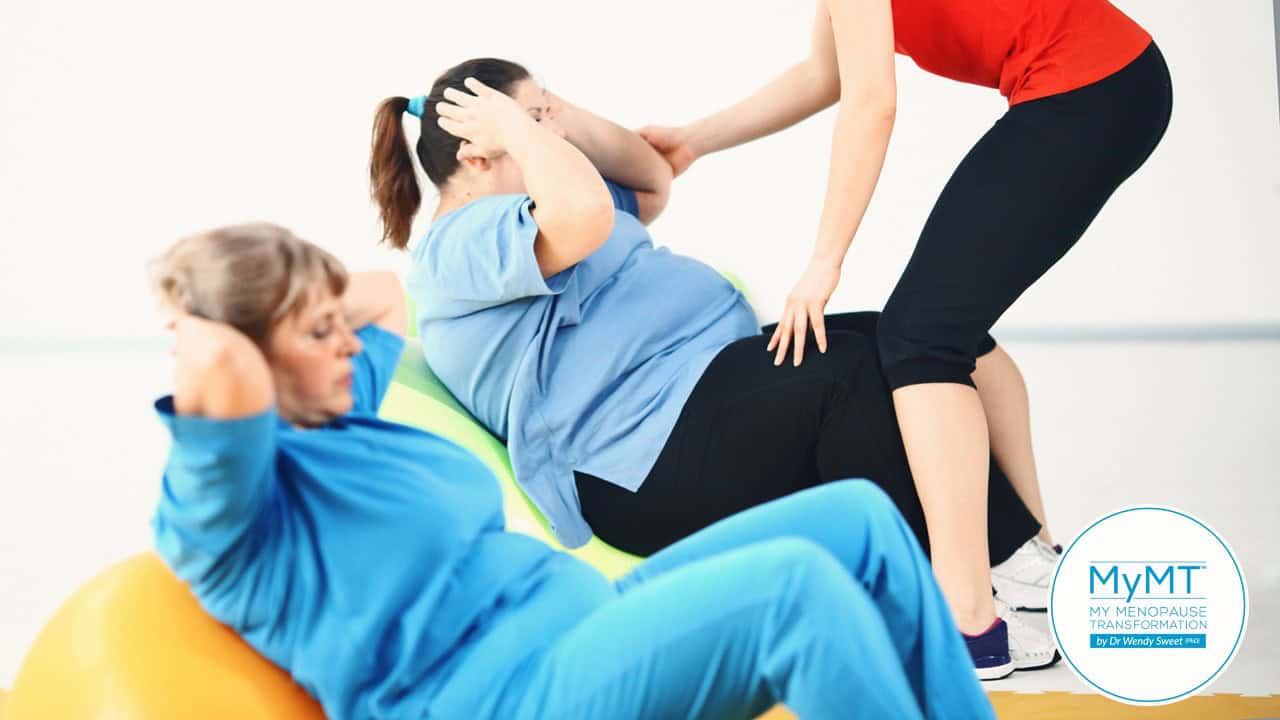“I hired a Personal Trainer online for the first time during the pandemic. I was really enjoying the sessions, but I have to admit, I didn’t lose any weight whatsoever – in fact my clothes are now tighter and I feel swollen and bloated.
He has also put me on a high protein diet and I just feel heavy and bloated all the time. I’ve been reading your newsletters and I’m realising that menopause may have something to do with it. I’m 50 years old, have a full time job and have two teens at home as well – I do feel busy and over-whelmed.” [Andrea, New Zealand]
Whether you followed Jane Fonda’s workouts or Bill Phillip’s prescriptive ‘Body For Life’ in the 1980s or not, exercise has always entered the mind of women who want to lose weight.
In the 1990’s when personal training arrived in New Zealand, workouts moved towards an emphasis on strength and conditioning training. As I was a PT at the time, I saw this ‘shift’ in exercise prescription.
As new pathways in fitness education also emerged over the past 2-3 decades, many Trainers not only have backgrounds in body-building, but also strength and conditioning of athletes.
Studying the role of Personal Trainers in supporting lifestyle change was part of my Master’s thesis, so I got to talk to quite a few as part of my interviews – hence, understanding their backgrounds in various sports as well as strength and conditioning for athletes.
This was the knowledge they bought into the fitness environment for their clients – not much was known about a woman’s menopause transition and the propensity she may have for putting on weight, despite all the exercise. Hopefully this has all changed now!
Working in the exercise-education environment for over 25 years and going on to educate numerous PTs throughout New Zealand, not once in my weight loss lectures did I mention ‘oestrogen dominance’ – a term that, whilst controversial, I use in the context of localised fat storage and oestrogen production in fat cells. This is known to occur in women who are overweight or obese, with increased abdominal and diaphragmatic fat.
When it comes to exercise and nutrition for women going through menopause, there is still an emphasis on heavy weight training and eating large amounts of protein to turn over muscle. I regularly see this on social media and in other channels.
But if women are already overweight and carrying a lot of abdominal fat as well as not sleeping, these training regimes may be difficult to maintain for women who are exhausted and experiencing a changing hormonal environment.
As I found myself, if women aren’t sleeping well, then their muscles and liver may not be recovering from all the exercise training.
If women are also on high amounts of protein for building muscle, the ageing liver, kidneys and pancreas might also struggle to process the higher amounts of amino acid intake. Then if the protein is mainly meat or other animal products, then this may also be problematic to their ongoing cardiovascular health and the risk of coronary plaques in middle-age and older women. (Bernstein, Qi Sun et al, 2010).
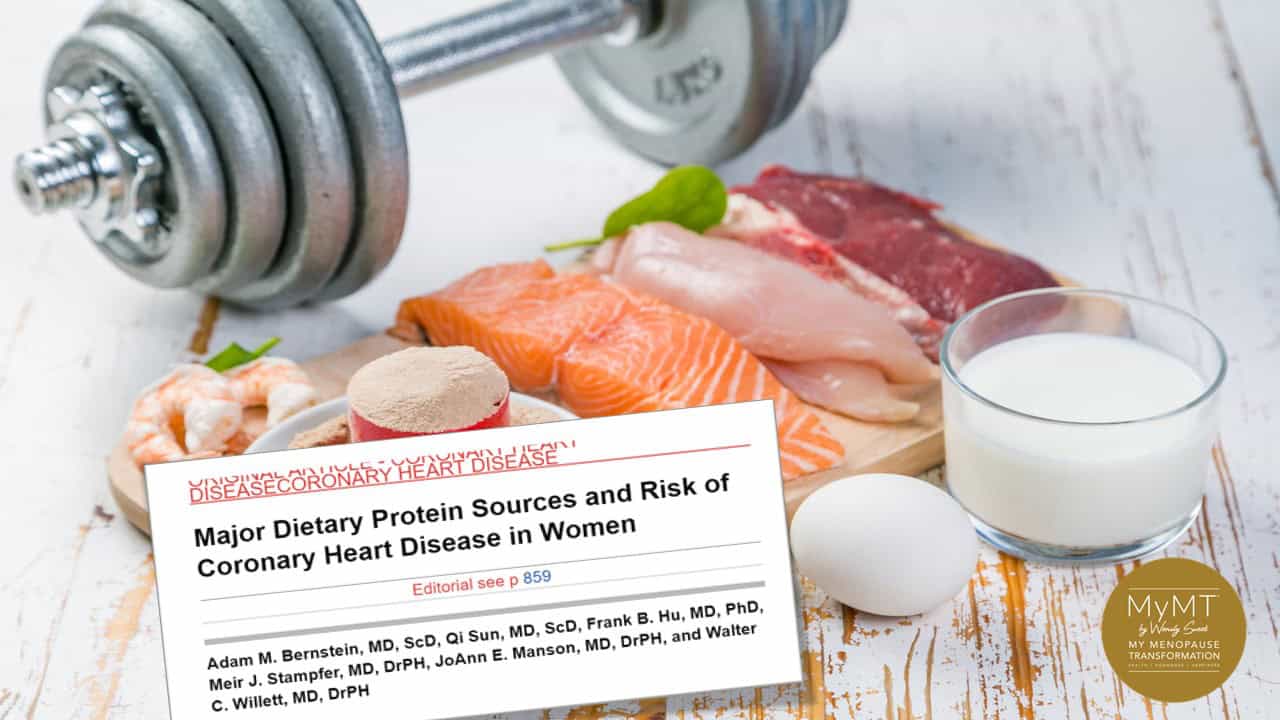
According to new research on fat metabolism and health during and after menopause, for women aged 50– 65 years, weight gain is one of their major health concerns (Marsh, Oliveira et al, 2023).
This is understandable as obesity is one of the most common disorders globally, and its prevalence in post-menopausal women is increasing. World-wide, the prevalence of obesity has more than doubled since 1980 – not so long ago for most of us to remember.
It is well known in Type 2 diabetes research that the hormonal changes across the perimenopause substantially contribute to increased abdominal obesity which leads to additional functional and health challenges with age. If we can get on top of our weight gain in menopause, then we help to set ourselves up for a healthier ageing. I can’t emphasise this enough.
Abdominal fat is now considered to be an endocrine organ – it is responsive to hormonal influence and has the capacity to secrete adipokines. These are important regulators of appetite and satiety (fullness), energy expenditure, inflammation, blood pressure, endothelial function influence, insulin sensitivity, and energy metabolism in insulin-sensitive tissues, such as liver, muscle, and fat.
Adipokines also help to regulate insulin secretion from our pancreas. Hence, increased storage of fat in fat cells can lead to inflamed fat cells, increased presence of cellulite under the skin and over time, metabolic health chaos.
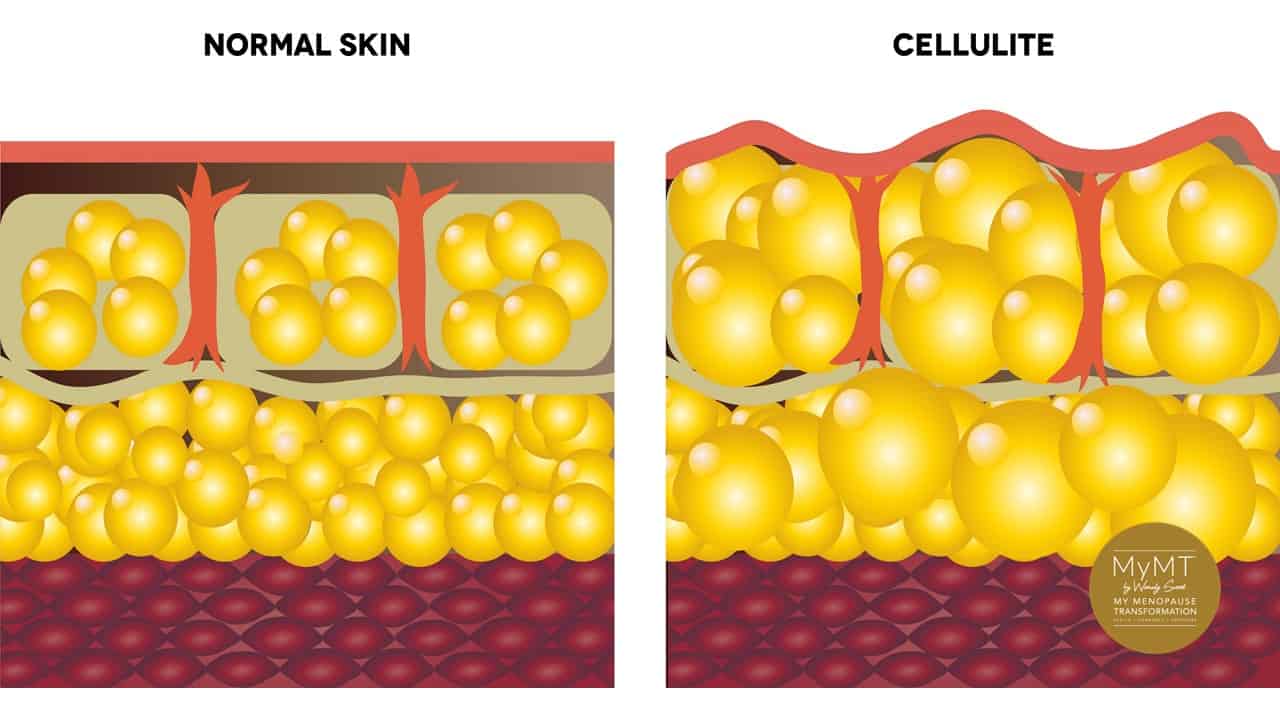
Although weight gain per se, cannot only be attributed to the menopause transition, the changes in hormonal levels make us more susceptible to the deposition of abdominal fat in many of our organs, not only just around our abdominal region and under our diaphragm.
That’s why mid-life weight loss needs a multi-dimensional approach. If you are a Personal Trainer or Health Professional, I talk about this in my certified Menopause Weight Loss Coach Course.
One of the problems with women doing lots of exercise to try and lose weight during menopause, has to do with their sleep quality and quantity. In Sport and Exercise Science, it is well known that exhausted female athletes who aren’t sleeping, very quickly develop adrenal fatigue – which can, as I’ve mentioned numerous times, increase cortisol levels causing even more metabolic chaos.
So, if you are frustrated with your changing weight and body-shape in menopause, then here are just some interventions for you to focus on, that I cover in more depth in the MyMT™ programmes:
- Restful Sleep: we can add 1-2 kg a week during menopause when we can’t sleep. And we know this thanks to a Swedish study of 400 middle-aged women who recorded shortened sleep duration and weight gain. The problem is that this is what changes our health as we age – my mother included. When we lose our precious deep sleep between 2-4am, then much of this weight becomes dangerous fat that goes on our belly and under our diaphragm. As I often say to women who are trying to exercise off their weight gain, “If you aren’t sleeping, then you aren’t losing.” So, change your exercise to more restorative, aerobic exercise, until you sort out your sleep.
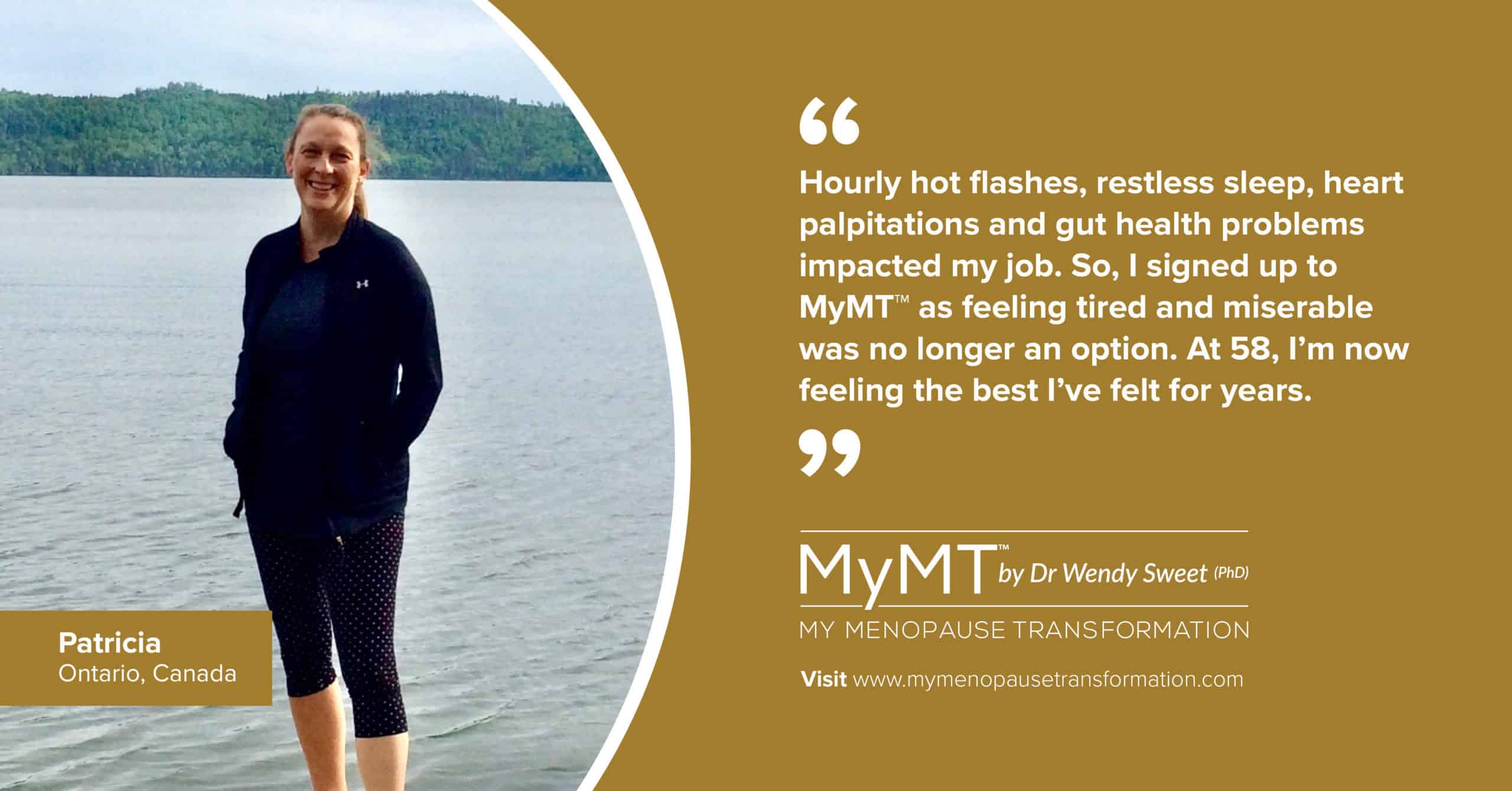
- Manage a condition known as ‘Oestrogen Dominance’: Fat cells can store excess unopposed oestrogens. These may be in the body due to our dietary choices, as well as our exposure to hormone-agents in the environment. When this happens, there is more oestrogen stored in our fat cells and this ‘dominates’ the internal environment. As oestrogen becomes the dominant hormone and our liver isn’t clearing excess oestrogen (or cholesterol) efficiently, oestrogen storage may cause progesterone to lower. It’s why liver health is important to us as we age. We clear excess oestrogens via our liver and during menopause, our liver changes in structure and function as part of our normal biological ageing of our organs.

- Focus on reducing blood sugar and insulin spikes, especially after meals (this is known as post-prandial hyperglycemia). Maintaining a healthy blood sugar level throughout the day is important, not only to your hot flush management, but also to your weight gain. As our hormonal environment is changing during our menopause transition, our insulin production and secretion changes too.
With better control of insulin surges from our pancreas, you help to control your energy levels, moods, hot flushes and your weight. Unstable insulin production in the pancreas can create inflammatory changes in our body as we move into post-menopause and this contributes to weight gain, even despite the exercise.
This occurs due to unstable insulin production when blood levels of glucose become too high. Over time, this may lead to Type 2 diabetes. Nutrition is your best medicine when it comes to weight management in menopause.
As such, you need to understand that the evidence behind the Mediterranean Diet for women in menopause to manage weight has been evolving for years. This is the type of dietary approach that I take in the MyMT™ Transform Me programme which focuses women on their weight management.
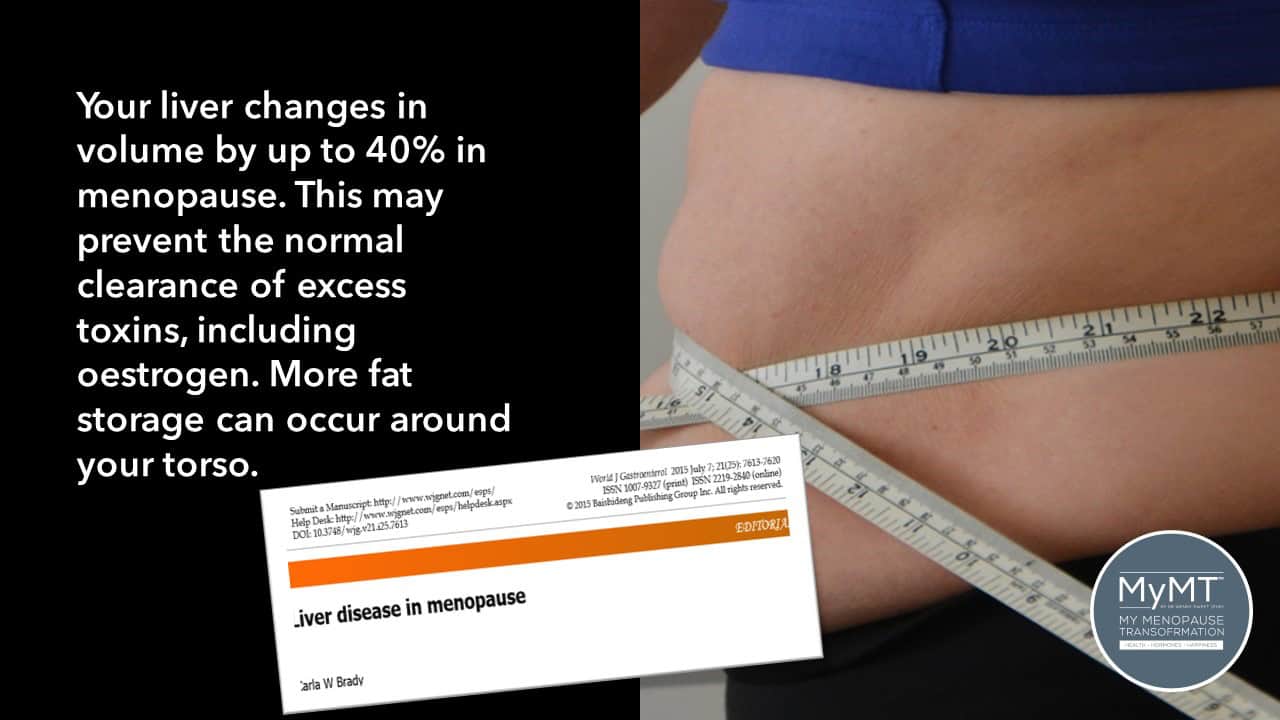
- Monitor Vitamin D levels – Low oestrogen levels in our skin may cause low Vitamin D levels in the body. This increases fat storage. Our skin is our largest organ and is full of oestrogen receptors. Vitamin D is a fat-soluble vitamin and is produced in the skin with the help of oestrogen. Therefore, many women are at risk of low vitamin D levels and because Vitamin D is now recognised as a hormone, low levels have an effect on other hormones in the body too. This is due to the feedback system that operates with all of our hormones.
Vitamin D is such a powerful hormone for women to monitor in menopause because it is also implicated in melatonin production. This is our sleep hormone, and when Vitamin D levels are low, our insomnia increases and our mood hormone, serotonin, is reduced.
Serotonin works with dopamine to help our mood and motivation. So, if you are on menopause-related anti-depressants, then ask your Doctor to also check your Vitamin D levels too. Restoring Vitamin D and sleep is crucial to your ongoing health, depression management and your weight.
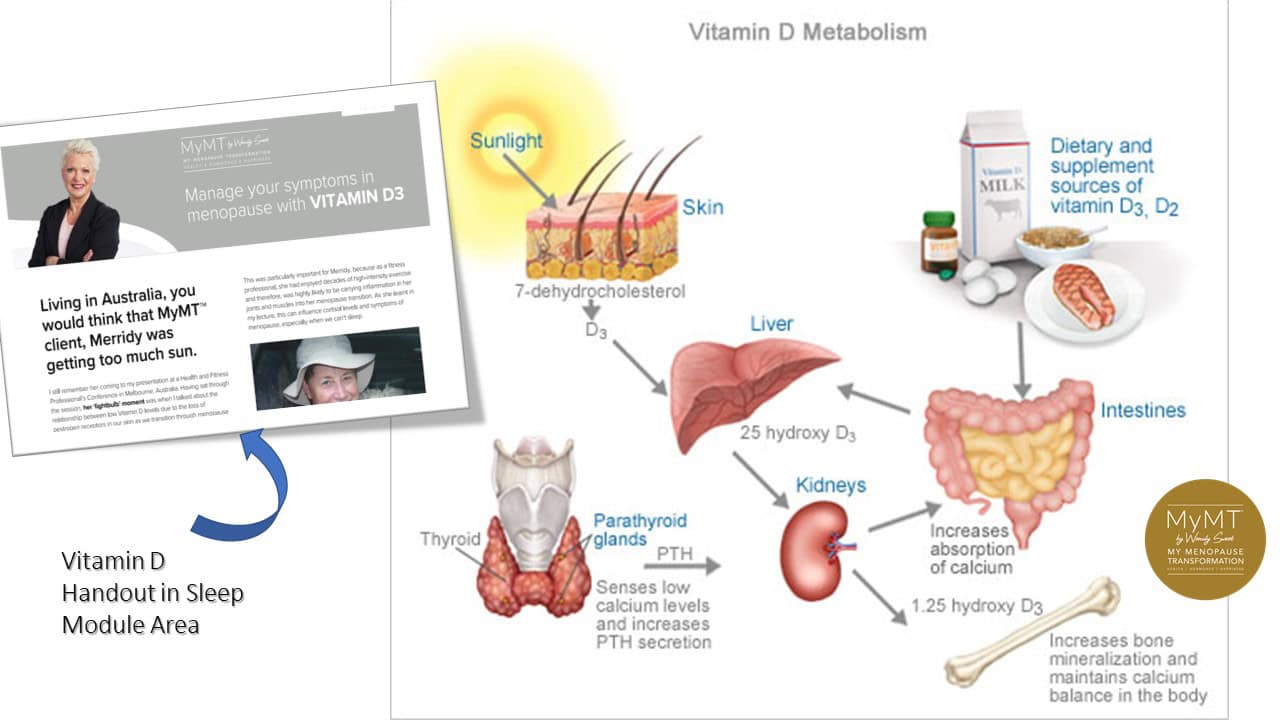
- Manage your stress – In menopause and post-menopause our body doesn’t resist stress as well as it used to, so blood pressure, heart rate and temperature go up more readily when we are feeling stressed and overwhelmed as we continue our busy lives.
Some stress is good for us, but the problem in our menopause transition is that too much stress (and this includes from not sleeping and/ or over-exercising), may increase cortisol levels leading to adrenal fatigue.
Cortisol is a powerful stress hormone which works in conjunction with melatonin, your sleep hormone. Too much stress (emotionally and physically) interferes with your sleep. When you don’t sleep, your insulin levels stay high and you resist overnight fat-burning. It’s a vicious cycle as so many women exercisers discover in their frustration with not losing weight despite all the exercise. Elaine in the UK was the same and soon learnt, that sleeping all night and managing insulin levels, comes before too much heavy exercise. Her story is HERE.
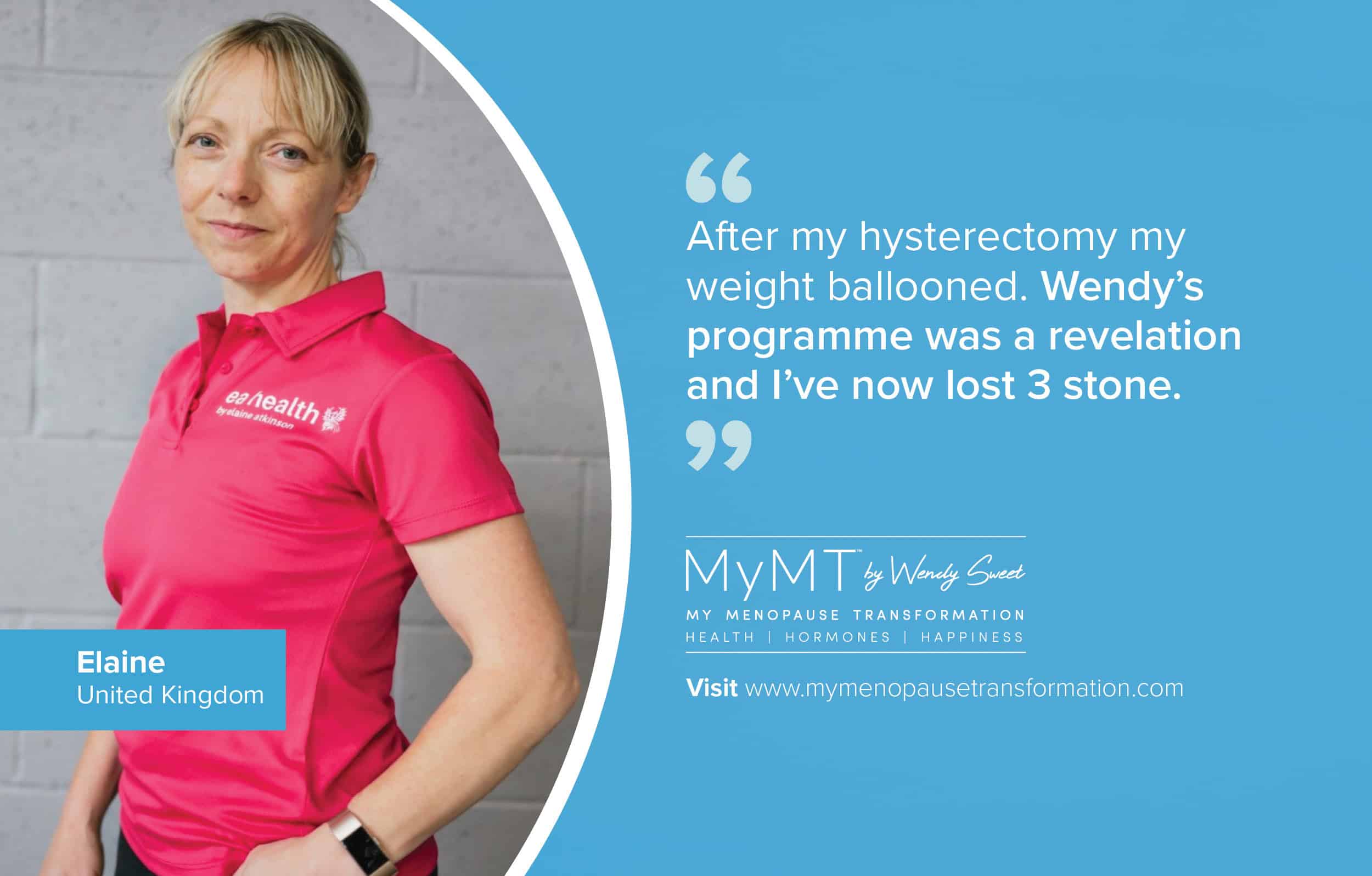
I know full well the weight loss struggles that many of you may be facing. I was the same. It’s my privilege to help women understand that weight management in midlife, is not about menopause HRT or supplements, it’s about sleep, liver health, gut health, sensible eating and more gentle exercise, until your body has reduced the inflammation that the additional fat is contributing too. So, spend some time looking at the Transform Me weight loss programme and see if this is right for you. My video about how the programmes work, is below.
Dr Wendy Sweet [PhD] Member: Australasian Society of Lifestyle Medicine
References:
Bernstein, A., Qi Sun, M., Hu, F., Stampfer, M., Manson, J., & Willett, W. (2010). Major Dietary Protein Sources and Risk of Coronary Heart Disease in Women. Circulation, AHA, 122(9), 1-8.
Davis, S. Castelo-Branco, C. Chedraui, P., Lumsden, M., Nappi, R., Shah, D. & Villaseca P. (2012). The Writing Group of the International Menopause Society for World Menopause Day 2012. Understanding weight gain at menopause, Climacteric, 15:5, 419-429,
Jehan, S., Masters-Isarilov, A., Salifu, I., Zizi, F., Jean-Louis, G., Pandi-Perumal, S. R., Gupta, R., Brzezinski, A., & McFarlane, S. I. (2015). Sleep Disorders in Postmenopausal Women. Journal of sleep disorders & therapy, 4(5), 212.
Manco, M. ,Nolfe, G. , Calvani, M., Natali, A., Nolan, J., Ferrannini, E., Mingrone, G. (2006). Menopause, insulin resistance and risk factors for cardiovascular disease. Menopause, 13 (5), 809-817
Marsh ML, Oliveira MN, Vieira-Potter VJ. Adipocyte Metabolism and Health after the Menopause: The Role of Exercise. Nutrients. 2023 Jan 14;15(2):444. doi: 10.3390/nu15020444.
Patni, R., & Mahajan, A. (2018). The metabolic syndrome and menopause. Journal of Mid-life Health, 9(3), 111–112.
Weickert M. O. (2012). Nutritional modulation of insulin resistance. Scientifica, 2012, 424780.
